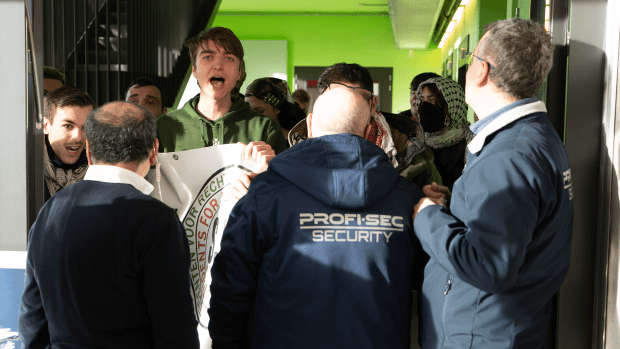
Riots are becoming the new normal at the UvA
We could easily blame the cause of the riot surrounding Minister Brekelmans’ visit to the UvA on the Executive Board, but that is a bit too easy and unfair, professor Marc Salomon believes. “There is little support in big cities for tough policing.”
Last Wednesday, a big row erupted following Defence Minister Ruben Brekelmans’ (VVD) visit to the UvA, where he was to be interviewed by Room for Discussion students. It is widely heard that the UvA - and the Executive Board in particular - should have intervened more firmly, but that is a bit too easy and also unfair. In large cities, for instance, there is generally little support for tough police action; indeed, this is immediately called “disproportionate” in the media and in local politics or framed as “UvA deploys the Mobile Police Unit (ME) against its own students and staff”.
Many members of the judiciary also downplay events in such cases. I wonder if the courts will accept dismissal and deregistration of staff and students, when all is said and done. Arguments such as “protection of the right to demonstrate”, “lack of evidence” (who among those present smashed this window?) and “protection of vulnerable group/adulting children” emphatically play into it.
The Hague
Politicians in The Hague also take it too easy, with big words and a rain of motions about all this not being acceptable. But under the guise of “autonomy of educational institutions”, ministers say time and again that they cannot intervene in disturbances at universities. Even amending the law to be able to put things in order from The Hague fails. Nobody wants to burn their hands on this and the autonomy of educational institutions is and remains sacrosanct. If the minister, the judiciary and the Executive Boards do not present a united front, this will become the new normal, I fear.
Downplay
To prevent this, the major parties must take responsibility. The minister can amend legislation to allow universities to act more quickly and effectively when serious disruptions occur. For example, by giving universities a legally firmer mandate for rapid suspension or removal of rioters, or by facilitating criminal prosecution of violence against university buildings and staff with fast-track justice, as with football hooligans. When disturbances are recognized not just as a university problem but as a wider social problem, more direction can be taken.
The judiciary plays a crucial role. If violent actions and vandalism in the context of university protests are structurally downplayed under the guise of demonstration rights, the threshold for escalation becomes lower. Stricter rulings, considering, for example, university violence as an aggravating circumstance, can send a signal that the rule of law also applies within academia.
University administrations should not limit their role to retrospective crisis management, but adopt proactive policies. That means: setting clear boundaries, not endless dialogue with structurally disruptive groups, and taking a common line with other universities. If individual universities remain reluctant to act consistently, rioters will keep finding a new weak spot.
Marc Salomon is professor of Decision Science at the UvA and dean of the Amsterdam Business School.

